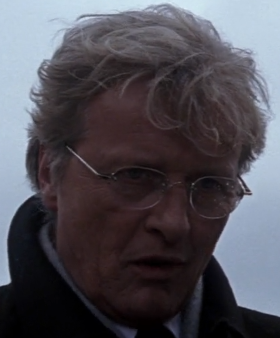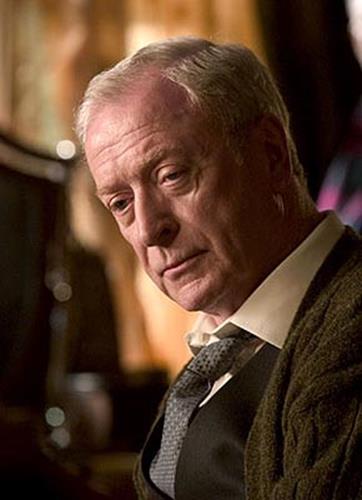The CEO Wayne Enterprises Deserves?
July 16, 2012 in Editorial

In Batman Begins we’re introduced to William Earle, the CEO of Wayne Enterprises. By the end of the movie, Bruce Wayne fires him and appoints Lucius Fox as the new CEO of Wayne Enterprises. It’s a classic story of good triumphing over evil in the corporate world. But did Earle really deserve to lose his job? Centives realized the answer is no.

One of Earle’s most controversial decisions as CEO seems to have been to take the company public, and sell shares of Wayne Enterprises on the stock market. There is some suggestion that this is a bad thing. But is it? By going public the company is opening itself up to new sources of finance, as well as regulatory and shareholder scrutiny. This should create a higher degree of professionalism, ensuring that the future of the company is truly secure.
Moreover we are told repeatedly that even though Wayne Enterprises is doing well, the rest of Gotham City is suffering. By going public Wayne Enterprises is giving a chance to Gotham’s citizens to invest in the company and share in its success. This might ultimately do more to help the poor in Gotham than any train system built by the company, since it opens a path to prosperity for the country’s residents. Experts say that public companies are “central to innovation and job creation.”
Earle has to have Bruce Wayne declared dead to liquidate his holdings in Wayne Enterprise. The decision to declare him dead is the right thing to do on business grounds. The future of Wayne Enterprises, and thus Gotham City, should not be held up by a man who has been missing for 7 years. When Wayne is declared dead his shares go to his butler, Alfred, who is shown to be an intelligent bloke.

The only way to have taken the company public is to have convinced Alfred to sell his shares. So while we’re told in the movie that Thomas Wayne probably wouldn’t have taken the company public, Alfred is convinced that going public is in the company’s, and Gotham’s best interest. It is telling that at the end of Batman Begins, Bruce Wayne chooses to keep the company public, rather than delist the shares from the stock market.
Another indictment of Earle seems to be that he has taken the business into “heavy arms manufacture.” But there’s no suggestion that his weapons are being used to aid terrorists or rebels, as we see happen with Tony Stark’s weapons in Iron Man. There are arguably some legitimate uses for weapons. Ask the current democratic Afghan government that is desperate for civilian and military aid so that it can prevent the Taliban – a repressive organization that doesn’t have even a modicum of respect for the rights of women – from taking over the country. Or look at South Korea, a peaceful democracy, which in 2010 had one of its ships attacked by a nuclear-armed North Korea.
Perhaps Thomas Wayne would not have wanted his company to go into arms manufacture. But a company has a duty to stakeholders other than just deceased owners. It has been 20 years since Thomas Wayne died. Would it really be fair to Apple’s customers if in 2031 Apple is still making decisions based on what Steve Jobs thought was right?
There are still ethical objections to being involved in heavy arms manufacture on any level, and that’s a fair viewpoint to hold. But it’s difficult to criticize Earle just for having a different political position, especially as he acts well within the boundaries and the spirit of the law. Moreover we are told that this sector has shown “very healthy growth” and Batman himself demonstrates how this technology can be useful by utilizing the Tumbler in his crusade against crime.

Once again Earle has helped the citizens of Gotham by taking the company in this direction.
We’re then told that Earle removed Lucius Fox from the board of directors and sent him down to become head of Applied Sciences – a dead end. We’re not given much information about this aside from Fox saying that he was causing the board trouble. Since we don’t have more information about what kind of trouble Fox was causing, it’s difficult to know how to interpret this. We know that Earle is open to criticism and dissent – some members of his board openly disagree with the direction he is taking the company and he calmly and respectfully responds to them. Perhaps Earle and Fox just don’t get along, and if that’s the case, then demoting Fox is fair enough. The CEO has the right to work with people that he feels comfortable with.
We finally arrive at what is so far the largest indictment of Earle. He let the train that Thomas Wayne built “go to rot.” While one would imagine that this would be the city’s responsibility more than Wayne Enterprises’ there is no getting around the fact that it was in Earle’s power to make the city a better place to live.
Fast-forward to the climax and Earle fires Fox. Once again this is entirely in his remit at CEO, and we’re never actually told why he’s firing Fox. By that point however, Fox has been supplying Bruce Wayne with equipment – without telling Earle about it – and using Wayne Enterprises’ resources to develop an antidote to the Scarecrow’s fear toxins. While the antidote works, it is untested and it is frankly dangerous for Fox to just administer it to Bruce Wayne – and then ramp it up for mass production without telling Earle or the FDA. If any CEO had gotten a hint of something like this happening they too would have fired Fox.
Finally Earle is somewhat condescending to Bruce Wayne when he tells him that the process of going public is a little technical, suggesting that Bruce wouldn’t understand. However Earle is there when Bruce buys a hotel to change the rules after the two supermodels he brings decide to use the water feature as a swimming pool.

It’s not Earle’s fault for believing that Bruce doesn’t understand, and isn’t interested in business. That’s precisely the image that Bruce has worked so hard to cultivate.
In fact throughout the film there are suggestions that Earle cares for Bruce. After his father’s death, he tells a young Bruce that with Alfred he is in good hands, and that the company will be taken care of. After Bruce returns from the dead, Earle tells him that he is the only one left of his family and that he belongs at Wayne Enterprises. And he seems upset and disappointed by Bruce’s behavior when he (seemingly drunkenly) asks his guests to leave his birthday party, suggesting that Earle cares on at least some level.
The case for Earle as CEO is strong. He led the company to continued growth in a time when the economy of the rest of the city “limped along” and he helped the company mature by taking it public. In a city that is notorious for corruption, his record seems clean. The clearest criticism of him is that he let graffiti take over the train system – the very same system that Batman later destroys. Could it be that William Earle is the CEO that Wayne Enterprises deserves?
Read more of our coverage of The Batman, and find out how much Bruce Wayne is worth. You can find this and other articles in our Editorials although for a selection of the best check out our Greatest Hits. And be sure to stay in touch:



I always thought Earle got fired because he was so condescending to Bruce Wayne due to the scene where Bruce repeats Earle’s dismissive line to him: “It’s complicated”. Perhaps Bruce had something to do with Earle’s mistaken idea the scion of Wayne Enterprises was not interested in business, but Earle is really dismissive of Bruce Wayne. It’s never good to underestimate potential enemies, particularly those who tend to hold grudges. And while Bruce Wayne may be overall “good”, he silently holds grudges against those who’ve wronged him a long, long time….
I’m sorry but this article seems to totally ignore the HUGE firing offense that is destroying the paper trail and covering the tracks of the League of Shadows in order to spare his company any possible liability.
Earle must have known that it was a terrorist weapon and instead of warning the law he covered it up!
Even if you might think that he is portrayed unsympathetically before that he is definitely accomplice after the fact to one of the worst WMD terrorist attacks ever by the end of the film.
It takes some pretty serious willful ignorance to think that he was undeserving of his quiet firing at the end of the movie when he should have been escorted out in handcuffs. Filing the serial numbers off WMDs is a pretty serious lapse in ethics.
im intrested
A case could be made that Fox and Wayne are perpetrating a multibillion dollar fraud against Wayne Industries stockholders. As long as Wayne is a public company, Fox has a responsibility to ensure that all shareholders have an equal opportunity to profit from the company. Unless Lucius Fox is giving kickbacks in the form of weapons technology to all of Wayne Industries stockholders, Fox is breaking his fiduciary duty. Odds are, the SEC, FTC, and a couple dozen other regulatory agencies to whom Wayne Industries would file statements with in normal business would also have a few choice words/grand jury indictments for Mr. Fox and Mr. Wayne.
“no suggestion that his weapons are being used to aid terrorists”
…yeah, apart from that one that was going to be used to destroy gotham in the first film.
To be fair, we have no idea how Lucius Fox did as CEO. It’s possible that he would have done even better.
Doesn’t Lucius Fox say about the microwave emitter that it might have been tested to vaporize chemicals and put them in the air, and that this was illegal? Wouldn’t that make him corrupt or operating outside the law?
It would be the military testing things in that way not Earle himself, especially not when he’s taking the company public. He couldn’t risk any bad news sneaking out, so no, I don’t think that would be on him…